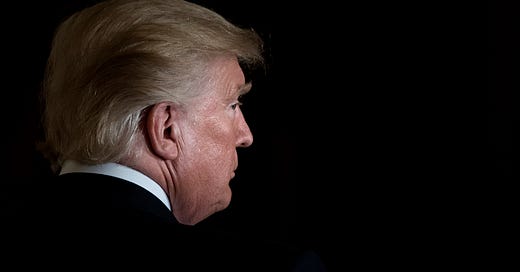
When the Senate opened its impeachment trial by swearing an oath to “do impartial justice,” the candid citizen might ask whether such a thing is even possible. The candid senator might, too. How can partisan senators do “impartial justice?” First, by understanding what is on trial. And second, by understanding what the Senate was created to be.
This is a trial of President Donald Trump, but it is more than that. As their oath emphasized, the senators sit in judgment of “the trial of the impeachment of Donald John Trump.” These words echo the Constitution itself, which entrusts the Senate with “the sole Power to try all Impeachments.” Which means that this is a trial of the House’s impeachment—which is to say, a trial of not just the facts and legal questions surrounding Trump, but also retrospectively of the prudential judgments surrounding the House’s decision. Which requires the Senate to make prudential judgments of its own.
The breadth of discretion inherent in impeachment has been evident since the Founding. The Constitution defines impeachment broadly in terms of “treason, bribery, or other high Crimes and Misdemeanors.” The Founders knew that this standard is not susceptible to easy legal definition. As Alexander Hamilton explained in The Federalist, impeachment “can never be tied down by such strict rules, either in the delineation of the offense by” the House that prosecutes it, “or in the construction of it by” the Senators who stand in judgment of it.
Rather, he wrote, impeachable offenses “are of a nature” best described as “political”—not political in the low sense of partisanship, but in the highest senses of statesmanship and the “public trust.”
And while the president’s lawyer, Alan Dershowitz, contends that “abuse of power” is not grounds for impeachment, Hamilton saw otherwise: impeachment would be the ultimate protection against “abuse of the executive authority.” (“What more,” Hamilton added, “could be desired by an enlightened and reasonable people?”)
The founding generation entrusted these judgments to the Senate because they intended the Senate to embody a mix of both accountability and statesmanship—and to be deeply invested in the administration of government power.
While the executive branch would always take the lead in administration, the Framers intended for the Senate to temper the executive’s worst instincts in crucial ways: by playing a significant role in the appointment of Cabinet secretaries, ambassadors, and other officers; and by playing a similar role in diplomacy, through its power in making treaties.
And these powers, deeply investing the Senate in good administration, were precisely what Hamilton expected to animate senators in impeachment: a readiness to “punish the abuse of [the Senators’] confidence or to vindicate their own authority.” While impeachment was never intended to be a tool for policing run-of-the-mill “maladministration” (as Madison warned), it was part of the Senate’s core tools for preventing extraordinary miscarriages of administration or abuses of power.
In short, the same Senate that was intended temper the House in matters of legislation—the metaphorical saucer to cool hot House coffee—would also temper the president.
And the Senate’s dual position, guarding against the House and the presidency alike, is at the heart of the “impartial justice” that senators are now asked to provide: In trying this impeachment, they are supposed to stand impartially between the House’s institutional interests, and the presidency’s.
Those colliding institutional interests are the crux of this impeachment battle. The House has impeached the president, in part, for his broad assertion of executive privilege against congressional oversight.
House oversight is indeed fundamental to the House’s exercise of its express constitutional powers. But executive privilege “is fundamental to the operation of Government and inextricably rooted in the separation of powers under the Constitution,” as the Supreme Court emphasized in the Nixon tapes case. Accordingly, the task for the Senate today is, as it was for the Court in 1974, to eschew both sides’ categorical assertions of power, and to make more nuanced, prudential judgments that strike the best possible balance between the House’s and the president’s powers.
Meanwhile, for senators to vindicate the Founders’ vision of a Senate that prevents executive abuses and promotes good administration, they should not preemptively reject factual information by categorically foreswearing witnesses.
If the House or the president moves for witnesses to testify, then the senators should carefully consider whether each prospective witness’s testimony would aid the senators’ judgment with respect to the charges brought by the House, or to the defenses asserted by the president.
Finally, the Senate should scrutinize the president’s use of shadow diplomacy—which is at the heart of the Ukraine affair.
The president has broad power to define his administration’s foreign policy, but his heavy reliance on Rudy Giuliani and other personal agents flouts the Constitution’s framework for the appointment of officers and ambassadors. The Constitution trusts the Senate to guard against the president’s unilateral staffing of the administration. If the president is systematically thwarting the Senate’s constitutional role, then the impeachment trial provides the Senate’s last opportunity to protect against the bitter fruits that the president’s actions produced.
The senators swore an oath to “impartial justice.” Will they live up to their oath? Hamilton hoped so. When senators try impeachments, he wrote, we must “count upon their pride, if not upon their virtue.”










